APPROACH
LIFEWORLD APPROACH
connect2community shares the core values for an approach that reflects and supports our philosophical position for person centered practice and the ideals of humanistic caring. We offer this framework not as a treatment technique to be applied, but rather as a philosophy and a mindset of service delivery. The Lifeworld Approach to care focuses on understanding or interpreting a person in a wider temporal frame, and beyond the context of their neurological injury or illness.
We are committed to this approach and apply this approach in the following ways:
We are interested in you as a person ‘a unique individual’; and being a part of your life, ‘for a moment in time’ to best understand what matters most to you.
We take time to establish and cultivate a therapeutic relationship in order to understand the details of your world. Therapeutic relationships involve trust and cannot be rushed. It is an ongoing and valued process.
We appreciate the unique nature of your communication and/or swallowing difficulties. You are seen as the expert on your feelings, thoughts and experiences about your communication and/or swallowing difficulties.
We ensure you are involved in every decision to be made, i.e., we ensure you have choice. Making choices is part of life and maintains our essential involvement in life.
Your uniqueness as a person exists in relation to others i.e., in relation to your community (e.g., family, friends, colleagues). As human beings we naturally seek ‘shared’ common experiences and connections. We understand and appreciate the desire to connect with others in times of change for support and guidance. We encourage and support you to achieve this.
We incorporate narrative or storytelling to help you make sense of significant life changes. The temporal narrative structure encourages the sharing of your life story (i.e., past, present, and future life). Using personal narrative, we help you to see your strengths and encourage you to consider possibilities over limitations.

Collaborative goal setting
Value of goal setting
The value of therapy goals lies in the direction and purpose they provide. When we set a goal, we are giving ourselves a target to strive for. We can set long-term goals along with weekly and daily goals. The benefits of this practice includes an increase in motivation, a sense of responsibility for achieving the goal, and an opportunity to track progress.
At connect2community, collaborative goal setting and goal-directed therapy is at the heart of our person-centered practice and integral to our communication and swallowing management plan. At connect2community when we talk about goal setting, you might hear us ask “ What’s important to you?” or “What would you like to work on?”. The goal setting process is collaborative in which your speech pathologist guides you through the process to assist you in establishing and refining your meaningful and real-life communication and/or swallowing goals.
Goal setting is seen as a dynamic process that is reviewed across the therapy program to reflect your current context, wishes and communication and/or swallowing journey.
It is important that goals are Specific/Shared, Measurable/Monitored, Achievable/Accessible, Realistic/Relevant, Time-bound/Transparent, Evolving, and Relationship-centered. The SMART and SMARTER framework is used to ensure that goal setting is truly collaborative and person centered.
Stories are at the heart of life participation
At connect2community we advocate for a narrative ‘storytelling’ approach (i.e., written, spoken, visual, and signed) as part of our therapy, with the aim to support reintegration into the community, and re-engagement in life’s valued social connections and meaningful activities.
“When we say stories are at the heart of life participation, what we mean is that we are the stories we tell. Our stories allow us to frame our sense of identity or self, in part because stories are at the heart of our interactions as humans.”
(Strong & Shaddon, 2020, p.129)
Any sudden and dramatic life change in communication or swallowing ability is an intensely personal experience. People can experience changes to their sense of self and identity, and their current and future lives may be filled with uncertainty.
“All of us, whether we have a communication or swallowing disorder or not, process life through stories, particularly significant life events. As we process these events, our stories change based on how we feel about those events and about ourselves.”
(Strong & Shaddon, 2020, p.129)
A narrative storytelling approach has been found to support emotional expression, reflection, and communication, contributing to overall positive identity growth.
“The temporal structure of storytelling, with a beginning, middle and end, supports the integration of new experiences with past experiences” creating a sense of meaning for the narrative.
(D’Cruz, Douglas & Serry , 2021, p. 12)
Storytelling has a transformative power. Used purposefully, stories have the potential to link the past, present, and future in meaningful way. Through telling these stories, we connect with others and affirm our own sense of self.
At connect2community, storytelling is used as a tool for
“engaging clients, hearing their voice and better understanding their needs”
(D’Cruz, Douglas, & Serry, 2021, p. 103)
D’Cruz, K., Douglas, J., & Serry, T. (2021). Humanising brain injury rehabilitation: A qualitative study examining humanising approaches to engagement in the context of a storytelling advocacy programme. Brain Impairment, 23(1), 91-103.
D’Cruz, K., Douglas, J., & Serry, T. (2020). Sharing stories of lived experience: A qualitative analysis of the intersection of experiences between storytellers with acquired brain injury and storytelling facilitators. British Journal of Occupational Therapy, 83(9) https://doi.org/10.1177/0308022619898085
Strong, K., & Shadden, B. (2021). Stories at the heart of life participation: Both the telling and listening matter. In A. L. Holland & R.J. Elman (Eds.), Neurogenic Communication Disorders and the Life participation Approach: The social imperative in supporting individuals and families. Plural Publishing (pp. 129-155). San Diego, CA.

